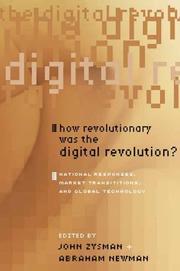| Listing 1 - 10 of 43 | << page >> |
Sort by
|
Book
ISBN: 901202871X Year: 1980 Publisher: 's-Gravenhage Staatsuitgeverij
Abstract | Keywords | Export | Availability | Bookmark
 Loading...
Loading...Choose an application
- Reference Manager
- EndNote
- RefWorks (Direct export to RefWorks)
#SBIB:316.334.2A24 --- #SBIB:HIVA --- nieuwe technologieën --- Chips --- Micro-elektronica --- Technologische verandering: algemene ontwikkelingen (mechanisering, automatisering) --- 67
Book
Abstract | Keywords | Export | Availability | Bookmark
 Loading...
Loading...Choose an application
- Reference Manager
- EndNote
- RefWorks (Direct export to RefWorks)
Labour market --- 331.5 --- #SBIB:HIVA --- #SBIB:316.334.2A24 --- #SBIB:316.334.2A320 --- Arbeidsmarkt. Werkgelegenheid --(algemeen) --- Technologische verandering: algemene ontwikkelingen (mechanisering, automatisering) --- Arbeidssociologie: morfologie van de arbeidsmarkt --- 331.5 Arbeidsmarkt. Werkgelegenheid --(algemeen)
Book
ISBN: 0906336201 090633621X Year: 1981 Publisher: London CSE books
Abstract | Keywords | Export | Availability | Bookmark
 Loading...
Loading...Choose an application
- Reference Manager
- EndNote
- RefWorks (Direct export to RefWorks)
Sociology of knowledge --- Sociology of work --- Labour economics --- Communism and science --- Working class --- Technological innovations --- Communisme et sciences --- Travailleurs --- Innovations --- Social aspects --- Aspect social --- #SBIB:316.334.2A24 --- #SBIB:HIVA --- Arbeid 331 --- Technologische verandering: algemene ontwikkelingen (mechanisering, automatisering)
Book
ISBN: 0861763882 Year: 1988 Volume: vol. 18, number 6, 1988 Publisher: Bradford MCB University Press
Abstract | Keywords | Export | Availability | Bookmark
 Loading...
Loading...Choose an application
- Reference Manager
- EndNote
- RefWorks (Direct export to RefWorks)
#SBIB:316.334.2A24 --- Beroepskwalificaties 331.543 --- Theorie van de arbeidsverhoudingen. Human relations --- Technologische verandering: algemene ontwikkelingen (mechanisering, automatisering) --- 331.1 Theorie van de arbeidsverhoudingen. Human relations --- 331.1 --- #SBIB:316.334.2A300 --- Arbeidssociologie: arbeidsmarkt en werkloosheid: algemeen --- Labour market

ISBN: 0521209455 9780521209458 Year: 1976 Volume: 25 Publisher: Cambridge Cambridge University press
Abstract | Keywords | Export | Availability | Bookmark
 Loading...
Loading...Choose an application
- Reference Manager
- EndNote
- RefWorks (Direct export to RefWorks)
Computer. Automation --- United Kingdom --- Automation --- Computer industry --- Labor supply --- Economic aspects --- Effect of automation on --- -Automation --- -#SBIB:316.334.2A24 --- -Labor force --- Labor force participation --- Labor pool --- Work force --- Workforce --- Labor market --- Human capital --- Labor mobility --- Manpower --- Manpower policy --- Automatic factories --- Automatic production --- Computer control --- Engineering cybernetics --- Factories --- Industrial engineering --- Mechanization --- Assembly-line methods --- Automatic control --- Automatic machinery --- CAD/CAM systems --- Robotics --- Electronic industries --- -Technologische verandering: algemene ontwikkelingen (mechanisering, automatisering) --- -Economic aspects --- #SBIB:316.334.2A24 --- Labor force --- Technologische verandering: algemene ontwikkelingen (mechanisering, automatisering) --- Automation - Economic aspects - Great Britain --- Computer industry - Great Britain --- Labor supply - Effect of automation on - Great Britain

ISBN: 9780674169869 0674169867 0674169859 9780674169852 Year: 1986 Publisher: Cambridge (Mass.): Harvard university press
Abstract | Keywords | Export | Availability | Bookmark
 Loading...
Loading...Choose an application
- Reference Manager
- EndNote
- RefWorks (Direct export to RefWorks)
Why do we find ourselves living in an Information Society? How did the collection, processing, and communication of information come to play an increasingly important role in advanced industrial countries relative to the roles of matter and energy? And why is this change recent-or is it? James Beniger traces the origin of the Information Society to major economic and business crises of the past century. In the United States, applications of steam power in the early 1800s brought a dramatic rise in the speed, volume, and complexity of industrial processes, making them difficult to control. Scores of problems arose: fatal train wrecks, misplacement of freight cars for months at a time, loss of shipments, inability to maintain high rates of inventory turnover. Inevitably the Industrial Revolution, with its ballooning use of energy to drive material processes, required a corresponding growth in the exploitation of information: the Control Revolution. Between the 1840s and the 1920s came most of the important information-processing and communication technologies still in use today: telegraphy, modern bureaucracy, rotary power printing, the postage stamp, paper money, typewriter, telephone, punch-card processing, motion pictures, radio, and television. Beniger shows that more recent developments in microprocessors, computers, and telecommunications are only a smooth continuation of this Control Revolution. Along the way he touches on many fascinating topics: why breakfast was invented, how trademarks came to be worth more than the companies that own them, why some employees wear uniforms, and whether time zones will always be necessary. The book is impressive not only for the breadth of its scholarship but also for the subtlety and force of its argument. It will be welcomed by sociologists, economists, historians of science and technology, and all curious in general.
Communication --- Information technology --- Information society. --- Computers and civilization. --- Technologie de l'information --- Société informatisée --- Ordinateurs et civilisation --- Social aspects --- Aspect social --- Information society --- Computers and civilization --- 007.5 --- 34:681.3 --- -Computers and civilization --- -#SBIB:IO --- #SBIB:316.334.2A24 --- IT (Information technology) --- Technology --- Telematics --- Information superhighway --- Knowledge management --- Sociology --- Civilization and computers --- Civilization --- Communication, Primitive --- Mass communication --- Zelfwerkende systemen --- Informaticarecht --- -Social aspects --- -Technologische verandering: algemene ontwikkelingen (mechanisering, automatisering) --- 34:681.3 Informaticarecht --- 007.5 Zelfwerkende systemen --- Société informatisée --- #SBIB:IO --- Technologische verandering: algemene ontwikkelingen (mechanisering, automatisering) --- Social change --- Computer. Automation --- United States --- Communication - Social aspects - United States --- Information technology - Social aspects - United States --- United States of America

ISBN: 0804753342 0804753350 9780804753357 Year: 2006 Publisher: Stanford Stanford University Press
Abstract | Keywords | Export | Availability | Bookmark
 Loading...
Loading...Choose an application
- Reference Manager
- EndNote
- RefWorks (Direct export to RefWorks)
How do high wage countries stay rich in a global digital economy? How Revolutionary was the Digital Revolution constructs a framework for analyzing the international digital era: one that examines the ability of political actors to innovate and experiment in spite of, or perhaps because of, the constraints posed by digital technology.
International economic relations --- Computer. Automation --- Technologie de l'information --- Innovations --- Industries de pointe --- Mondialisation --- Aspect économique --- 007.5 --- #SBIB:316.334.2A24 --- #SBIB:309H1720 --- informatica - cybernetica - Internet - Sociale media (zie ook 681.3) --- Technologische verandering: algemene ontwikkelingen (mechanisering, automatisering) --- Informatiekunde, informatie management --- Innovations technologiques --- Industries de pointe. --- Aspect économique. --- Globalization --- High technology industries --- Information technology --- Technological innovations --- Industries --- Economic aspects --- Innovation

ISBN: 0803979819 0803979800 9780803979802 9780803979819 Year: 1995 Publisher: London : Sage,
Abstract | Keywords | Export | Availability | Bookmark
 Loading...
Loading...Choose an application
- Reference Manager
- EndNote
- RefWorks (Direct export to RefWorks)
Sociology of knowledge --- Information technology --- Technologie de l'information --- Social aspects --- Aspect social --- Social aspects. --- 316.77 --- #SBIB:309H1710 --- #SBIB:316.334.2A24 --- Informatietechnologie 681.3:60 --- Communicatiesociologie --- Telematica, algemene werken --- Technologische verandering: algemene ontwikkelingen (mechanisering, automatisering) --- 316.77 Communicatiesociologie --- Information technology - Social aspects.

ISBN: 0582714990 Year: 1985 Publisher: London Longman
Abstract | Keywords | Export | Availability | Bookmark
 Loading...
Loading...Choose an application
- Reference Manager
- EndNote
- RefWorks (Direct export to RefWorks)
Sociology --- Social policy --- Computer. Automation --- computers in het welzijnswerk --- 364.4 --- #SBIB:316.334.2A24 --- #SBIB:316.334.2A554 --- 361.03 --- Hulpverlening. Bijstand --- Technologische verandering: algemene ontwikkelingen (mechanisering, automatisering) --- Partijen en strategieën in de onderneming: technologische verandering en zijn effecten op structuur en inhoud van de arbeidsposten --- 364.4 Hulpverlening. Bijstand --- Social Sciences and Humanities. Sociology -- Social Welfare --- ALLW.
Book
ISBN: 9264121250 9789264121256 Year: 1980 Publisher: Paris Organisation for Economic Co-operation and Development. Centre for Co-operation with Non-Members
Abstract | Keywords | Export | Availability | Bookmark
 Loading...
Loading...Choose an application
- Reference Manager
- EndNote
- RefWorks (Direct export to RefWorks)
Foreign trade policy --- Technology transfer. --- Transfert de technologie --- Technology transfer --- #SBIB:316.334.2A24 --- #SBIB:316.334.2A25 --- Technological transfer --- Transfer of technology --- Diffusion of innovations --- Inventions --- Research, Industrial --- Technology and international relations --- Foreign licensing agreements --- Technological forecasting --- Technological innovations --- Technology --- Technologische verandering: algemene ontwikkelingen (mechanisering, automatisering) --- Na-oorlogse industriële ontwikkeling: concentratie en multinationalisering --- International cooperation
| Listing 1 - 10 of 43 | << page >> |
Sort by
|

 Search
Search Feedback
Feedback About
About Help
Help News
News